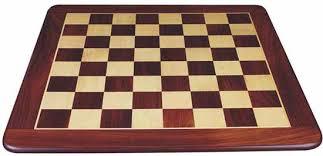Infinite knights and the Chessboard
 Suppose you are given a normal 8 X 8 chessboard and hundreds of spare green-colored knight pieces lying about. If any knight is able to capture any other knight, find the highest number of knights, you can place on the board in non-attacking positions.
Suppose you are given a normal 8 X 8 chessboard and hundreds of spare green-colored knight pieces lying about. If any knight is able to capture any other knight, find the highest number of knights, you can place on the board in non-attacking positions.
The answer is 32.
This section requires Javascript.
You are seeing this because something didn't load right. We suggest you, (a) try
refreshing the page, (b) enabling javascript if it is disabled on your browser and,
finally, (c)
loading the
non-javascript version of this page
. We're sorry about the hassle.
5 solutions
You can also line 8 in the bottom row and alternate rows so like all 8 in 1st row, 8 in 3rd row all the way to 7th row. 4 rows X 8 knights per row = 32 Knights.
Log in to reply
Actually, this will not work because knights in 1st row can attack knights in 3rd row.
Log in to reply
Actually, they don't.
Log in to reply
@Emily Peng – No, they do. Knights can attack both 1 and 2 rows above or below their own row.
Its clear that a chess board has 32 black squares and 32 white squares. Now, any knight in white square goes to black square in next move, and vice-versa. Now if we place all the knights in white(or black), then they will be in non-attacking position, since their next move will be to a black(or white) square. Thus, the no. of knights is 32. Now, we'll show that its not possible to place more than 32 knights. Let if possible, at least 1 more knight can be placed. Thus, it must be placed in a black square and hence, it will be in an attacking position with some other knight in white. Thus, the max. no. of knights is 32.
Your proof for how 33 is not attainable isn't complete. You did not address the cases where the rest of the knights aren't in the checkerboard pattern that you placed them; you only proved it for that special case.
Log in to reply
Now, i'm thinking the reverse way. Suppose, i've gt the arrangement of all the knights in white. If possible, let there be another arrangement where the no. Of knights is equal to 32. In that case i've to displace a knight from white and place it in black. It will come in attacking position with another in white. Thus, it has again to be displaced. Now, there are two ways to displace it. 1)either place it in a the white box emptied by the previous knight, or 2) place it in another black box. If the former is adopted then the previous knight will capture it. If the later is adopted, then the process will continue and a time will come, when all knights will be in black which is same as being in white. Thus, i place my argument, somewhat like this: "only two arrangements are possible for placing 32 knights and in either case, more than 32 knights can't be placed and hence, 32 is the highest no.'' If one claims to place more than 32 knights, then after removing some knights, we'll come to an arrangement of 32 knights which must be one of the two. It implies that its not possible to place more than 32 knights.
This is one of the examples of pigeonhole principle ...
I made a discussion problem about a month ago that builds on this, which no one has answered yet: https://brilliant.org/discussions/thread/no-knights-tour/
Knights only attack the opposite color squares which they are on. Since there are 32 white squares and 32 black squares, the answer is 32.
Notice that we can decompose a 8 × 8 chessboard into 8 non intersecting 2 × 4 rectangles. And on each of these rectangles we can put at most 4 knights that do not capture each other. Follow the image:
So, now since in 8 of these 2 × 4 rectangles we can at most 4 × 8 = 3 2 knights on a 8 × 8 board hat satisfies our condition .
But wait! We know that it isn't possible to put more than 3 2 knight on a 8 × 8 chess board in such a way that satisfies our condition. But it doesn't mean that 3 2 is attainable. So, we have show that it is.
If we arrange the knights in only in black squares we can get 3 2 knights.
So, 3 2 is our answer.